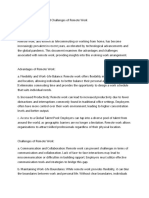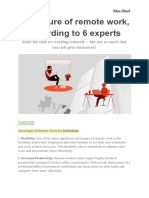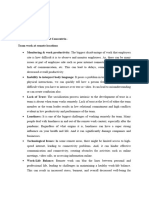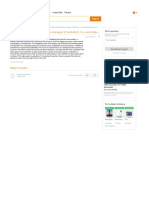Professional Documents
Culture Documents
The Benefits and Challenges of Remote Work
The Benefits and Challenges of Remote Work
Uploaded by
erkanaptiOriginal Description:
Copyright
Available Formats
Share this document
Did you find this document useful?
Is this content inappropriate?
Report this DocumentCopyright:
Available Formats
The Benefits and Challenges of Remote Work
The Benefits and Challenges of Remote Work
Uploaded by
erkanaptiCopyright:
Available Formats
The Benefits and Challenges of Remote Work in the Digital Age
In the digital age, remote work has become increasingly popular and feasible due to
advancements in technology. In this essay, we will explore the benefits and
challenges of remote work, examining how it has revolutionized the traditional work
model, improved work-life balance, and presented unique challenges for individuals
and organizations.
1. Flexibility and Work-Life Balance:
One of the primary benefits of remote work is the flexibility it offers. Remote
work allows individuals to have control over their schedules, enabling them to
balance personal and professional commitments more effectively. This flexibility
promotes work-life balance, reducing stress and improving overall well-being.
2. Increased Productivity and Job Satisfaction:
Remote work has been shown to increase productivity and job satisfaction. Without
the distractions and interruptions of a traditional office setting, individuals can
focus on their work and achieve higher levels of productivity. Additionally, the
autonomy and trust granted to remote workers often lead to increased job
satisfaction and motivation.
3. Cost Savings and Environmental Impact:
Remote work can result in significant cost savings for both individuals and
organizations. Remote workers save on commuting expenses, office attire, and meals
outside the home. Companies can reduce real estate costs by downsizing office
spaces. Moreover, remote work reduces carbon emissions associated with commuting,
contributing to a more sustainable environment.
4. Access to Global Talent and Diversity:
Remote work allows organizations to tap into a global talent pool, enabling them to
hire the best candidates regardless of their geographical location. This access to
diverse talent promotes innovation, creativity, and cultural exchange within
organizations, leading to better problem-solving and decision-making outcomes.
5. Challenges of Communication and Collaboration:
While remote work offers numerous benefits, it also presents challenges in
communication and collaboration. Without face-to-face interactions, remote teams
must rely heavily on digital communication tools, which can sometimes lead to
miscommunication or misunderstandings. Organizations must invest in effective
communication strategies and tools to overcome these challenges.
6. Maintaining Work-Life Boundaries:
While remote work provides flexibility, it can also blur the boundaries between
work and personal life. Without a physical separation between the office and home,
it becomes crucial for individuals to establish and maintain clear boundaries.
Setting specific working hours, creating a dedicated workspace, and practicing
self-discipline are essential for achieving work-life balance while working
remotely.
7. Potential for Social Isolation and Burnout:
Remote work can sometimes lead to feelings of social isolation, as individuals miss
out on the social interactions and camaraderie found in a traditional office
environment. Additionally, the lack of physical separation between work and
personal life can lead to burnout if individuals struggle to disconnect and
establish a healthy work-life balance. It is important for remote workers to
prioritize social connections and practice self-care to prevent burnout.
8. Security and Technical Challenges:
Remote work introduces new security and technical challenges for organizations.
Ensuring the security of sensitive data and protecting against cyber threats
becomes more complex when employees work from various locations. Organizations must
invest in robust cybersecurity measures and provide employees with the necessary
tools and training to mitigate these risks.
Remote work has transformed the traditional work model, offering benefits such as
flexibility, increased productivity, and cost savings. It has enabled individuals
to achieve a better work-life balance and has provided organizations with access to
a diverse talent pool. However, remote work also presents challenges in
communication, work-life boundaries, social isolation, and cybersecurity. By
addressing these challenges and implementing effective strategies, remote work can
continue to thrive and contribute to a more flexible, inclusive, and productive
work environment in the digital age.
You might also like
- HR Policies and StrategiesDocument17 pagesHR Policies and StrategiesSovan NandyNo ratings yet
- Creating We - Chaning I Thinking To WE PDFDocument10 pagesCreating We - Chaning I Thinking To WE PDFmandarem100% (1)
- Abap OopsDocument22 pagesAbap OopsKonduru MadhavaNo ratings yet
- IRDA IC-38 Corporate - Composite PDFDocument79 pagesIRDA IC-38 Corporate - Composite PDFH R NATURAL CARE INDUSTRIES0% (1)
- Kafka InternalsDocument30 pagesKafka InternalsDarshna GuptaNo ratings yet
- Title 2Document2 pagesTitle 2pratheekshasnair002No ratings yet
- 9Document2 pages9Irfan SadabNo ratings yet
- Advantages and Disadvantages of Remote WorkingDocument2 pagesAdvantages and Disadvantages of Remote WorkingThoa LeNo ratings yet
- Lektura Prasy ArtykułDocument2 pagesLektura Prasy Artykułsteamimon2No ratings yet
- Navigating The Remote Work RevolutionDocument8 pagesNavigating The Remote Work Revolutionsarfrazahmed34357No ratings yet
- The Benefits and Challenges of Remote Work in The Digital AgeDocument3 pagesThe Benefits and Challenges of Remote Work in The Digital AgeJas PerNo ratings yet
- The Rise of Remote WorkDocument3 pagesThe Rise of Remote WorkKing AyomideNo ratings yet
- The Advantages and Challenges of Remote WorkDocument3 pagesThe Advantages and Challenges of Remote WorkKane PleaseNo ratings yet
- Blog 3Document2 pagesBlog 3Zaineb MatiullahNo ratings yet
- 1Document1 page1workr285No ratings yet
- @annisuphere #Idea Sheet - Future of Remote WorkDocument12 pages@annisuphere #Idea Sheet - Future of Remote WorkninaNo ratings yet
- Νέο Έγγραφο Του Microsoft WordDocument2 pagesΝέο Έγγραφο Του Microsoft Wordgianns200523No ratings yet
- Benefits of Remote Work and How It Fuels Business Success - GigsterDocument1 pageBenefits of Remote Work and How It Fuels Business Success - GigsterdimahmadyNo ratings yet
- Speaking ComprehensiveDocument8 pagesSpeaking ComprehensivePhạm Thị Thùy TrangNo ratings yet
- 2 Advantage and DisadvantageDocument19 pages2 Advantage and DisadvantageMariam MiliNo ratings yet
- The Rise of Remote WorkDocument2 pagesThe Rise of Remote Worknoorjoni100No ratings yet
- The Impact of Remote Work On Productivity and WorkDocument3 pagesThe Impact of Remote Work On Productivity and WorkXaine PineraNo ratings yet
- Reflective-Essay 1.2Document3 pagesReflective-Essay 1.2Andrea MyrNo ratings yet
- 1Document2 pages1mundranehal3834No ratings yet
- The Benefits and Challenges of Remote WorkDocument2 pagesThe Benefits and Challenges of Remote WorkJuan BrattiNo ratings yet
- Material 1Document17 pagesMaterial 1prabinachudal2017No ratings yet
- The Evolution of Remote Work Navigating The Future of Flexible EmploymentDocument2 pagesThe Evolution of Remote Work Navigating The Future of Flexible EmploymentAntoine MNo ratings yet
- Am Ethical Argument Essay Final DraftDocument9 pagesAm Ethical Argument Essay Final Draftapi-653628343100% (1)
- The Future of Remote Work PDFDocument2 pagesThe Future of Remote Work PDFkosiwop kaudatNo ratings yet
- 2012 Executive DistributedWorkReportDocument13 pages2012 Executive DistributedWorkReportdesignedanddeliveredNo ratings yet
- The Impact of Remote Work On Employee Performance and WellDocument2 pagesThe Impact of Remote Work On Employee Performance and WellDrazen JovicNo ratings yet
- Mastering Remote Work: This comprehensive guide empowers you to succeed in the world of remote work.From EverandMastering Remote Work: This comprehensive guide empowers you to succeed in the world of remote work.No ratings yet
- The Benefits and Challenges of Remote WorkDocument1 pageThe Benefits and Challenges of Remote WorkAngBagong Barangay SanJuanNo ratings yet
- The Benefits and Challenges of Remote Wor1Document2 pagesThe Benefits and Challenges of Remote Wor1AngBagong Barangay SanJuanNo ratings yet
- Future of Remote Work ReportDocument2 pagesFuture of Remote Work Reportkamal muradNo ratings yet
- Future of Work (Non Economic Topic)Document11 pagesFuture of Work (Non Economic Topic)devang parulekarNo ratings yet
- Future of Work (Non Economic Topic)Document11 pagesFuture of Work (Non Economic Topic)devang parulekarNo ratings yet
- Ai 4Document1 pageAi 4mikeveb973No ratings yet
- 3Document1 page3Suranjan GoswamiNo ratings yet
- 12Document4 pages12Shirin KarwaniNo ratings yet
- Future of Remote Work Part 1Document5 pagesFuture of Remote Work Part 1huraira9111No ratings yet
- Impact of Remote Work On Productivity and Work-Life BalanceDocument2 pagesImpact of Remote Work On Productivity and Work-Life Balance022MausamNo ratings yet
- Assignment 2 Chap 7 ProfDocument5 pagesAssignment 2 Chap 7 ProfMuhammad AliNo ratings yet
- Comprehensive Speaking Seminar of The WeekDocument3 pagesComprehensive Speaking Seminar of The Weekthuy94575No ratings yet
- REPORTDocument3 pagesREPORTGino Lorenzo FloretesNo ratings yet
- Work From Home Productivity Hacks: Maximizing Efficiency in Virtual EnvironmentsFrom EverandWork From Home Productivity Hacks: Maximizing Efficiency in Virtual EnvironmentsNo ratings yet
- Working From HomeDocument4 pagesWorking From Home23521346No ratings yet
- Remote Working v2Document3 pagesRemote Working v2simaykoc.skNo ratings yet
- Remote Work Vs TelecommutingDocument3 pagesRemote Work Vs TelecommutingJaeNo ratings yet
- Work-Life Balance in Digital Age (Syed)Document3 pagesWork-Life Balance in Digital Age (Syed)Syed IbrahimNo ratings yet
- 18NA30017 - Happiness at Work - EndSemDocument14 pages18NA30017 - Happiness at Work - EndSemHhihhihiNo ratings yet
- The Revolutionary Evolution of Remote WorkDocument2 pagesThe Revolutionary Evolution of Remote Workiurascuiulia4No ratings yet
- Remote WorkDocument2 pagesRemote WorkEhab AlMukhaderNo ratings yet
- 15Document1 page15JhennNo ratings yet
- Impact of Information Technology On Work-Life BalanceDocument71 pagesImpact of Information Technology On Work-Life BalanceAmar Rajput100% (1)
- Alternative Workplace - Exclusive Summary (Main Content)Document6 pagesAlternative Workplace - Exclusive Summary (Main Content)Shahjada Yeasir Arafat ShuvoNo ratings yet
- 5 TitleDocument2 pages5 TitlebradhakemanNo ratings yet
- 24a ChallengesDocument4 pages24a ChallengesYourSUVINo ratings yet
- A306 Management Information Systems and The Networked Society AssignmentDocument4 pagesA306 Management Information Systems and The Networked Society Assignmentapi-3695734No ratings yet
- Wa0001.Document5 pagesWa0001.Sachin SharmaNo ratings yet
- Remote Work Pros and ConsDocument1 pageRemote Work Pros and ConssfgNo ratings yet
- GD UsmsDocument5 pagesGD Usmspalak kalraNo ratings yet
- The Rise of Remote Work: Transforming The Modern WorkplaceDocument1 pageThe Rise of Remote Work: Transforming The Modern WorkplaceDiego VargasNo ratings yet
- CZP 10MDocument82 pagesCZP 10Mkarlo.huberNo ratings yet
- Tax Invoice/Bill of Supply/Cash Memo: (Original For Recipient)Document1 pageTax Invoice/Bill of Supply/Cash Memo: (Original For Recipient)NAGARJUNANo ratings yet
- eMAX-MR50 Series3 Manual - Jan18Document9 pageseMAX-MR50 Series3 Manual - Jan18dube2012No ratings yet
- Porter WrightDocument4 pagesPorter Wrightadam_3000No ratings yet
- Economic PDFDocument188 pagesEconomic PDFpx SonarNo ratings yet
- Designing and Managing Global Marketing StrategiesDocument23 pagesDesigning and Managing Global Marketing StrategiesShreekānth DāngiNo ratings yet
- Mathematics Model Question (2077 (2020) ) : Neb-Grade XiiDocument2 pagesMathematics Model Question (2077 (2020) ) : Neb-Grade XiiAakhyanNo ratings yet
- How The Train TurnsDocument4 pagesHow The Train Turnsmrana_56No ratings yet
- Ticketcreator Barcodechecker Manual: Check Secure Tickets With BarcodesDocument8 pagesTicketcreator Barcodechecker Manual: Check Secure Tickets With BarcodesFedericoRuizCalamariNo ratings yet
- ORPAZ User Manual BookDocument16 pagesORPAZ User Manual BookBrian HennigNo ratings yet
- 9501期中黃瑞靜財務管理 (一)Document6 pages9501期中黃瑞靜財務管理 (一)অচেনা একজনNo ratings yet
- Ca Writ 628-2021Document9 pagesCa Writ 628-2021Thidas Herath MaduwalthanneNo ratings yet
- C. Sample Evaluation Form (Sheet)Document3 pagesC. Sample Evaluation Form (Sheet)Timothy John Natal MandiaNo ratings yet
- Heinz Avs310 Modern Flight Tracking GradedDocument6 pagesHeinz Avs310 Modern Flight Tracking Gradedapi-290806305No ratings yet
- 7B6006 StatTools TrngModDocument68 pages7B6006 StatTools TrngModPrashant BasukalaNo ratings yet
- Detailed MOS Gate Capacitance Model: Chapter 2 MOS Transistor TheoryDocument1 pageDetailed MOS Gate Capacitance Model: Chapter 2 MOS Transistor TheoryCarlos SaavedraNo ratings yet
- CSEET Legal Aptitude Marathon For Nov 2021Document69 pagesCSEET Legal Aptitude Marathon For Nov 2021Harsh GuptaNo ratings yet
- SILVASSADocument2 pagesSILVASSArheyan shahNo ratings yet
- Oil-Water Separation TechnogiesDocument4 pagesOil-Water Separation TechnogiesBrian FreireNo ratings yet
- Unit I IprDocument31 pagesUnit I Ipr124087026No ratings yet
- Mahindra Project ReportDocument76 pagesMahindra Project ReportDåñísh SãlmåñîNo ratings yet
- Company Tax Return 2023Document12 pagesCompany Tax Return 2023Carol YaoNo ratings yet
- Leslie Blandings, Division Manager of Audiotech, I...Document4 pagesLeslie Blandings, Division Manager of Audiotech, I...Rictu SempakNo ratings yet
- Chapter 2Document14 pagesChapter 2Abdullah OmerNo ratings yet
- Chapter Five Quality Management and Control: Complied by Asmamaw T. (PHD)Document57 pagesChapter Five Quality Management and Control: Complied by Asmamaw T. (PHD)Neway AlemNo ratings yet

























































































